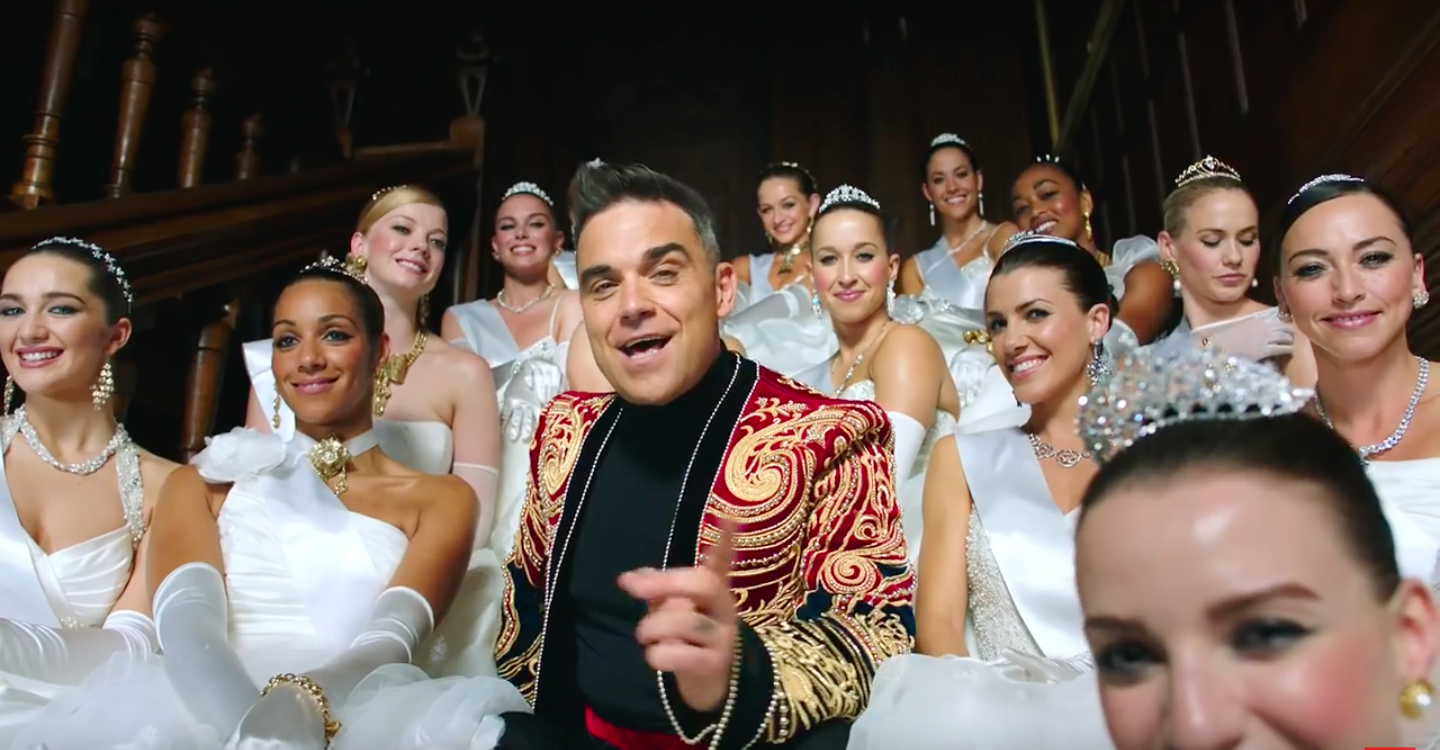
Observers speculate that Williams’s ideas for the song and video were heavily influenced by the wedding of the daughter of Russian oligarch Rashid Sardarov. Photo: Screenshot of Williams's new video.
Robbie Williams/YouTubeA Russian luxury party, according to Williams, must involve skimpily dressed ballerinas, buckwheat and sexy maids cavorting in spacious halls gilded with gold to samples from the works of composer Sergei Prokofiev. If oligarchs have fun, they do it in an original way, with a national flavor.
The video’s protagonist is a Russian oligarch who sucks money out of his country and spends more than half the population of the Western world earns.
He builds his own space station, has a yacht with a landing strip, a car on his plane and a bank in his car. He is crazy and never apologizes for anything. The video calls on fans to follow his example to get ready for the next revolution, which is already somewhere in the air.
Observers speculate that Williams’s ideas for the song and video were heavily influenced by the wedding of the daughter of Russian oligarch Rashid Sardarov, which took place in Prague in August. The oligarch, whose fortune is estimated at $100 million, hired the singer to perform at this celebration.
However, according to the official version of events, the wedding has nothing to do with the video’s aesthetics. As the singer explained to the press, Britons believe that they know how to have fun, but they’ve never seen Russians party — until now.
A Russian luxury party, according to Williams, must involve skimpily dressed ballerinas, buckwheat and sexy maids cavorting in spacious halls gilded with gold to samples from the works of composer Sergei Prokofiev. Source: Robbie Williams/YouTube
Another significant contribution to Russia’s global image was made this year by Slovenian comedian Klemen Slakonja whose parody video "Putin, Putout" became the quintessential expression of Western media coverage of Russia.
Slakonja, who looks like Putin, creates a colorful mix of the Russian president’s reaction to the protest punk band Pussy Riot, Russia’s gas wars with Europe, the country’s supposed claims to world domination, the Olympic Games in Sochi, the FIFA scandal and the fight against terrorism in his act.
He makes Putin into such an expressively charismatic person that he only manages to improve the president’s standing. Slakonja as Putin dances ballet in a leotard, hunts tigers, tries on an imperial image, flies to space and sits on a throne made of hammer and sickles that was clearly designed by the team behind Game of Thrones. In general, he runs the show, or the circus — whichever you prefer.
Slovenian comedian Klemen Slakonja makes Putin into such an expressively charismatic person that he only manages to improve the president’s standing. Source: Klemen Slakonja/YouTube
This song about a lonely girl who does not want to go home without a man appears at first glance to have little relevance to Russia. But in 2006, it became a meme because of a video by the British band Basement Jaxx.
The video incorporated all the possible clichés about the culture of the eastern Slavs. Somewhere in the middle of Siberia, this girl and a dozen bearded men drink moonshine, dance the hopak, play on surreal balalaikas under portraits of Lenin and Stalin and hang out with bears and ride horses.
But have no fear! A "Russian prince on a white horse" — actually a rather chubby, mustachioed military man on a tank — is rushing to save her. In the end, he takes her to his house, through a snowy forest.
However, "Take Me Back to Your House" is not actually about a house where you might live (or be taken to), but about house music, for which Basement Jaxx is famous. Few fans of the video caught onto these deeper meanings, however.
Somewhere in the middle of Siberia, this girl and a dozen bearded men drink moonshine, dance the hopak, play on surreal balalaikas under portraits of Lenin and Stalin and hang out with bears and ride horses. Source: KatrineSpb/YouTube
In the view of Sting, another famous British musician, the Russians behind their Iron Curtain were a complete mystery. It was unclear what they were doing, what they believed in, in the name of whom they lived – or how they had fun. But if they loved their children, like people everywhere, then the world might be saved. The musician expressed this message in his pacifist song, "Russians," released the year Mikhail Gorbachev came to power in the Soviet Union.
It was 1985, and several epochs have passed from that time to Robbie Williams and his Russian party. Apparently the mysterious Russian soul has become a little clearer to some and less predictable to others. The only constant here is Prokofiev — Sting based his melody on a theme from Prokofiev's Lieutenant Kije Suite.
Sting released his song, "Russians," the year Mikhail Gorbachev came to power in the Soviet Union. Source: StingVEVO/YouTube
This song about "Russia's greatest love machine" — as the German disco group dubbed Grigory Rasputin — introduced Russian politics as a theme for world music. Rasputin, of course, was already a recognizable historical figure, but after Boney M.'s 1978, he was reborn as a real Russian imperial superhero.
The end of the story is critical, however. Rasputin — a man who solved problems, a kind of gray cardinal known for his strong charisma and his way with women — was simply taken out. "This man's just got to go!", envious people said, calling Rasputin to "come to visit us." Boney M. sang. And what happened? He went to his death. "Oh, those Russians."
Boney M. introduced Russian politics as a theme for world music. Source: Carrie S./YouTube
All rights reserved by Rossiyskaya Gazeta.
Subscribe
to our newsletter!
Get the week's best stories straight to your inbox